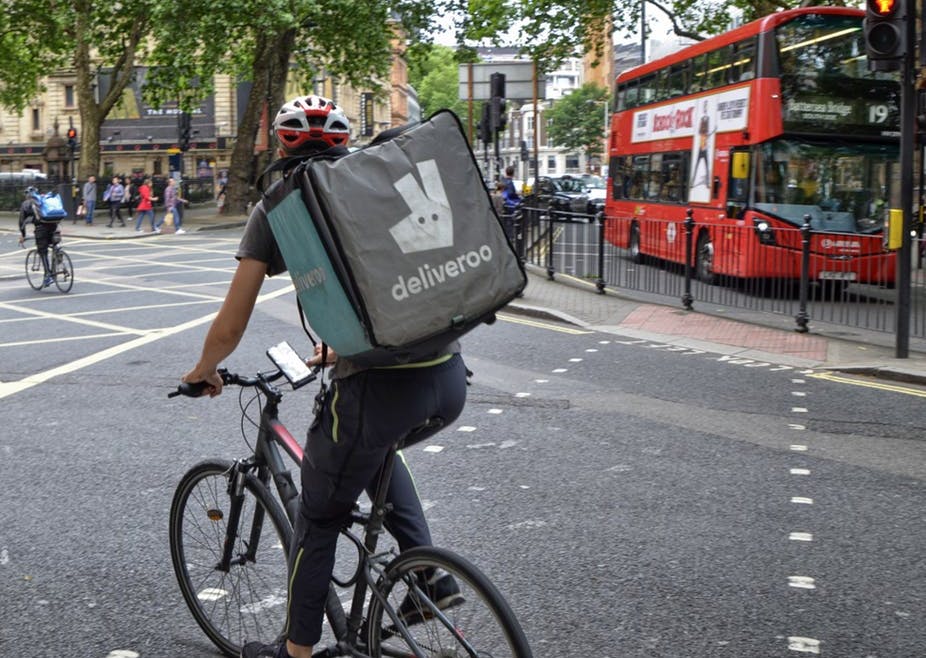In Europe and around the world, many people are delivering fast food on bicycles or acting as taxi drivers in their own cars, not quite employees and not quite self-employed. Following recent legal judgements in France, the UK and in other countries, the contractual status of these “gig workers” is again being questioned. We hear of the benefits of the flexible lifestyles afforded to workers in the “gig economy” but also complaints about precariousness and exploitation.
While gig economy platforms might be behaving in accordance with their legal contracts, many workers appear to feel that they are not being treated fairly. Another form of contract – known as the “psychological contract” – can perhaps help us understand.
Who is working in the gig economy?
All the signs suggest continued growth in the gig economy – paid work in short spells with no or limited commitment from either worker or company. This work frequently involves driving and delivering but can also cover other platform-mediated, short-term work, such as data coding. The work is frequently associated with the young – one survey in North America found that over 70% were aged under 45 and 90% were in higher education.
This youth profile allows proponents of gig work to justify the limited level of security, providing access to work for people with limited professional experience. Furthermore, having another activity, such as being a student, makes the flexibility and autonomy attractive.
Yet such on-demand service work leads to a rise in precariousness more generally, and may increase difficulties for finding secure, full-time work. Recent EU research highlights how damaging this “bogus self-employment” can be for young people trying to start their careers. Here we can see parallels with other forms of precarious work, such as temporary and zero-hour contracts, that are similarly prevalent among young people.
Tensions in the gig economy
Across various platforms of the gig economy, workers are agitating for more. There is evidence of Uber drivers wanting the right to unionise and some Foodora riders want their platform to pay operational costs, such as bike maintenance and mobile data fees. Workers on Amazon Mechanical Turk have petitioned to be treated like humans, not algorithms.
Many focus their complaints around a desire to be treated as employees. They claim to have the obligations of employees but not the benefits. Yet gig platforms are clear that they do not recognise this employee status nor the obligations that would come with such a relationship.
Violating the “psychological contract”
One way of understanding these tensions is through the lens of “psychological contracts”. Human resource management theorists have developed this concept to describe the various unwritten agreements, both explicit and implicit, that workers and employers believe they have with one another. It captures the intangible and hard to quantify elements of the employer-employee relationship, beyond the legal contract. These elements can include considerations of flexibility in the scope of the work, use of initiative, evolution of roles and workers’ loyalty to the employer.
These psychological contracts function when they are more or less balanced. The employee and employer make commitments to one another that make the relationship attractive to both parties. The ongoing nature of the relationship allows trust and reciprocity to develop.
Gig platforms say they want a one-night stand, not a relationship
Of course, not all employment relationships are ongoing. Psychological contract theory tells us that gig work, like other types of short-term work relationships, will tend to be more “transactional” rather than “relational”, with more straightforward exchange and less focus on mutual trust and commitment.
The latter seems to capture the relationship the gig economy platforms wish to foster, particularly in light of claims by platform workers to be employees. The platforms have tailored the terms and language of their contracts in order to demand a minimum of their workers and justify minimal obligations in return. Indeed for some workers, these transactional contracts are ideal.
A rough deal, or a broken one?
Yet protests and legal actions show that not all workers are happy. Psychological contract theory might offer two potential explanations for the tensions of the gig economy – workers are unhappy with the terms of the psychological contract, or they believe the platforms have violated the contract.
It is clear that some workers find the terms unfair. While it might be argued that workers have consented to these terms, consent becomes problematic when there are few better options. Young people in some countries face a lack of jobs, pushing them into low quality, poorly paid and precarious gig work.
It is also possible that gig workers initially consent to the psychological contract, but then believe the platform violates the terms. For instance, in 2016 Deliveroo encouraged workers to move to a new service contract, claiming that it would work out better for riders – when some found insufficient volume of work to maintain their earnings, the psychological contract was arguably violated.
A perception of reciprocity
Perception is an important feature of psychological contracts and the perceptions of the worker and firm are not necessarily always aligned. Since the terms of such psychological contracts are “in the eye of the beholder”, one party can believe that the other is failing to live up to obligations that the other does not recognise.
These perceptions can be informed by the legal and social context, and notions of what is fair. For example, ongoing research at Grenoble Ecole de Management has found that delivery riders perceive good customer service, such as rectifying errors, to be part of the job, yet they are not paid for such additional tasks. The platforms benefit from this commitment. On the other side, gig workers often expect, based on common-sense ideas of fairness, that platforms would not deactivate an account due to unreasonable passenger ratings. When this happens, the sense of betrayal can be intense. Reciprocity is what makes more conventional employer-employee relationships function and is perhaps part of what is missing for gig workers today.


